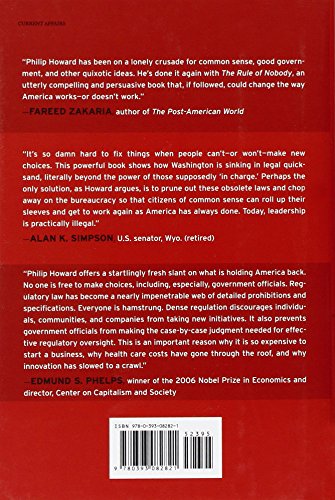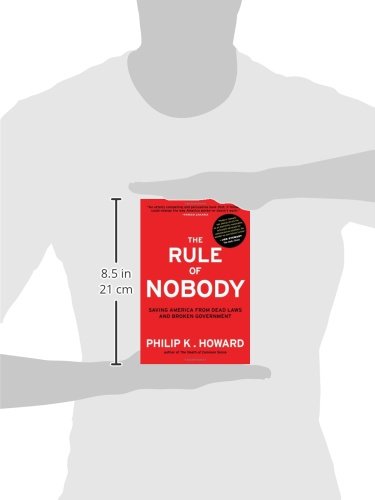Sobre nosotros
Servicios al cliente
Atención al cliente
Acceso Regional
Legales y políticas
Obtén la aplicación

Apunta tu cámara para descargar la aplicación
Copyright © 2024 Desertcart Holdings Limited




Full description not available
J**S
Good on the problems, weak on the solutions.
I always say that books that praise the good while glossing over the bad should be taken with a healthy dose of skepticism, and this book is no different. First, Mr. Howard's central thesis in the entire book is that the only thing that can solve the malaise of government is personal responsibility and trust in humans, which is fine, except that he offers very little evidence to support his claim besides one study of Australian nursing homes. The next issue in this book is that he points to other countries with the institutions that he thinks America should have, but fails to explain how they work besides a one sentence reasoning that fits his central thesis again, never mind that these institutions are apart of government to begin with. He never seems to fight off criticisms of unchecked human abuses of the powers that they might run into, basically saying that power humbles people (which is not true). The council of citizens has a problem with being corrupted just like the appointment of senators by the state legislatures did in the 19th and early 20th centuries, and it is very unclear what they would actually do.There are some great ideas in this book, a sunset clause for needless laws that have gone past their usefulness, and a way to modify laws by industry experts instead of career politicians, and the president being able to use the line-item veto to pass budgets or other bills without torpedoing the entire bill because some congressman attached a poison pill amendment to the draft.Overall, I think this book is good on the problems but not on the solutions. As a college professor of mine said to my class one day, "It is a lot easier to tear something down than to build it up"
D**Y
Required Reading for all Elected Officials Before Taking Oath of Office
In writing my book "Rule of Law: Why and How We Must Amend the Constitution" there were many instances where I felt the urge to give detailed examples of why a particular issue was a real problem that needed to be solved. In the end I chose to focus more on the solutions. I wish I could merge "The Rule of Nobody" with my book because it vividly describes the disaster that is the bureaucratic state and gives a stronger impetus for reform. Some have complained that this book is too repetitive or is too much of a rant but the numerous examples given are well-researched and are necessary to make a powerful case for reform.Howard has a different world view than me. I think his analysis is slightly off kilter in some respects and I am skeptical of some of his proposed solutions but this book is a valuable guide for understanding how government's laws are smothering our people. This book is an objective and fair critique of how chaotic and dangerous our legal system is.Howard also deserves praise for calling attention to the fact that amending the Constitution is the best hope of restoring sanity to government. This book is one more proof of the growing sentiment in America that deep structural reforms are necessary to fix government. Regurgitating new (but really the same) politicians will not suffice.
C**R
H
A good analysis of what has grown up around us - fields full of weeds (of rules and regulations). An example: our little city of 35K is looking to put 14 pages of ordinances in place to govern how local churches can "minister" to the homeless in our community. When can they feed them, where can they feed them, how many days in a row can they be housed or fed in one location (in a freaking church for crying out loud). There are already program guidelines in place that go farther than constitutionally allowed, were they to be put into municipal code, but, because some individual on the council is "concerned" about what "might" happen in the future they want to put bubble-wrap around it now to ensure nothing happens in that uncertain future. Oh, and lets not forget about the staffers (policy wonks) who went to school for this very thing, who need to justify their jobs, so give them a code to write and off they go, mindless as an amoeba replicating itself, writing code without thinking of the unintended consequence. BECAUSE, they have been educated in universities that no longer teach ethics, but rather relativism. No absolutes, no hitching post. Like migrating geese - they wake up in a new world every day. When you ask them about virtue and ethical reason they give you that "duck looking at thunder" look. Great book, highly improbable we could ever meet the challenge. Sad!
J**Y
A Must Read Book with examples on how to better our government decision making policies.
Excellent book. Gives real life events that cost US tax payers tens of millions of dollars just because of out dated laws and no one in authority with the power to change them or make the final decision. Their are examples of good politicians (all parties), lawyers, public employees, unions and more that are saddled with outdated laws so they can not make good public policy or act in the good for the general population. There are a few examples where because of these outdated laws individuals can slowdown, stop or use these laws to better their common interest. I bought this book because Time magazine had an article on Jeb Bush and it suggested to understand some of his thinking to move this country forward, you should read one of his favorite authors, Philip Howard and "The Rule Of Nobody". If you like history and what to see why things for schools to public works projects don't get done in a cost effective manner and what to have well thought out ideas on how we can start fixing these issues, I highly recommend this book. Favorite quote "No act of government is morally valid unless it can be justified as being in the common interest."
H**R
It is a excellent review about how the government works
It is a excellent review about how the government works, It illustrated how government workers create rules over and over again just to expand their responsibilities i.e. add workers on the government payroll, So the supervisiors get a pay hike due to their increased responsibilities.....Great reading for all of us who pay taxes tofeed those papercrunchers
J**S
excelente autor
Philip Howard tornou-se famoso após o lançamento de "the death of common sense". Agora esta sua obra dá continuidade à sua linha de pesquisa acerca do excesso de intervencionismo do estado na vida privada. O texto é claro e objetivo.
C**N
Legalistic approaches kill creativity
The Rule of Nobody clearly describes the dangers of seeking to develop a fool proof, policy and procedure driven approach to organisational leadership and managent. The examples given of over regulated approaches to government and how they strangle human creativity, and make simple solutions to complex problems impossible, serve as a warning to any organisational leader to focus on operational practices which empower people rather than restrict them.
M**
good
interesting
G**T
AN APPROPRIATE TITLE RULE OF NOBODY
THIS BOOK IS A WARNING TO THOSE THAT WOULD SHUT DOWN GOVERNMENT IN THE NAME OF DEMOCRACY. THE AUTHOR USES EXAMPLES OF WHAT DOES NOT GET DONE BECAUSE OF BUREAUCRACY AND THOSE THAT FIGHT AGAINST HAVING ANYTHING DONE IN THEIR BACK YARD. WHEREVER ONE LIVES THEY CAN SEE THE SAME EXAMPLES HAPPEN WHERE CONSULS VOTE AGAINST THE RECOMMENDATIONS OF THE PEOPLE THEY HIRE AS PLANNERS. THE BOOK IS WELL WORTH READING WHETHER IT WILL CHANGE ANYTHING OR NOT.
Trustpilot
Hace 1 mes
Hace 1 día